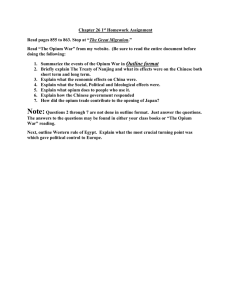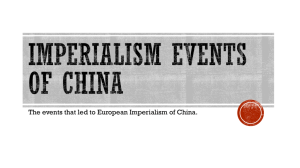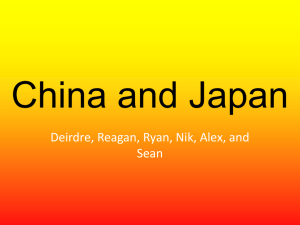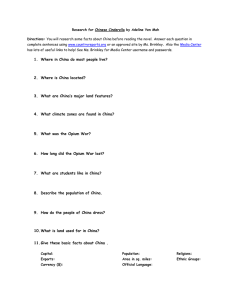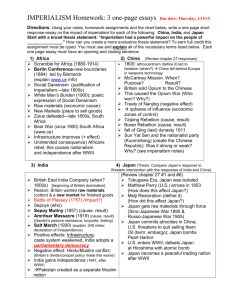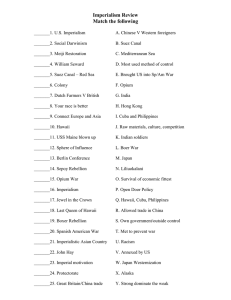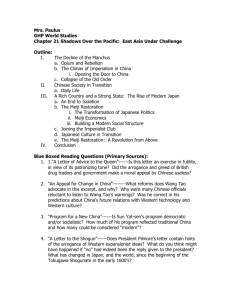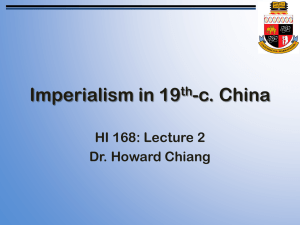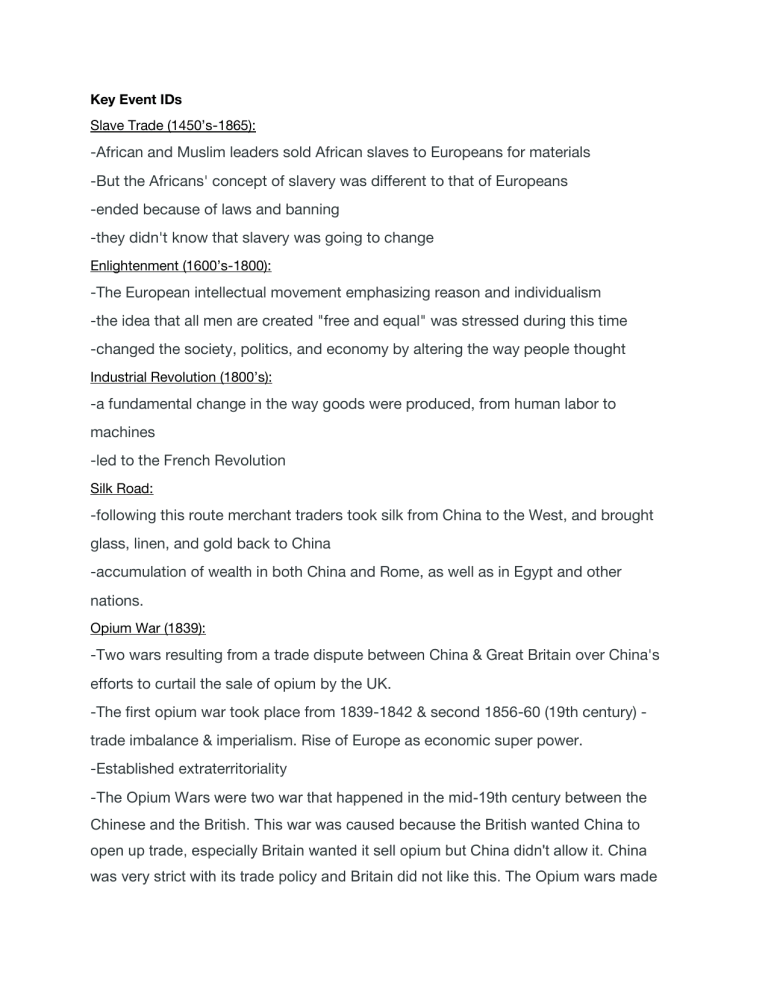
Key Event IDs Slave Trade (1450’s-1865): -African and Muslim leaders sold African slaves to Europeans for materials -But the Africans' concept of slavery was different to that of Europeans -ended because of laws and banning -they didn't know that slavery was going to change Enlightenment (1600’s-1800): -The European intellectual movement emphasizing reason and individualism -the idea that all men are created "free and equal" was stressed during this time -changed the society, politics, and economy by altering the way people thought Industrial Revolution (1800’s): -a fundamental change in the way goods were produced, from human labor to machines -led to the French Revolution Silk Road: -following this route merchant traders took silk from China to the West, and brought glass, linen, and gold back to China -accumulation of wealth in both China and Rome, as well as in Egypt and other nations. Opium War (1839): -Two wars resulting from a trade dispute between China & Great Britain over China's efforts to curtail the sale of opium by the UK. -The first opium war took place from 1839-1842 & second 1856-60 (19th century) trade imbalance & imperialism. Rise of Europe as economic super power. -Established extraterritoriality -The Opium Wars were two war that happened in the mid-19th century between the Chinese and the British. This war was caused because the British wanted China to open up trade, especially Britain wanted it sell opium but China didn't allow it. China was very strict with its trade policy and Britain did not like this. The Opium wars made China open to foreign trade in which now Britain was able to import Opium and trade freely in China. It has been noted that British caused a lot of damage mainly by taking over Canton. This event is brought the consequences that it weakened the Qing dynasty. This even is very significant to World History because it signaled the beginning of the massive nineteenth-century exposition of European imperialism Treaty of Nanking (1842): -The Treaty of Nanking or Nanjing was a peace treaty which ended the First Opium War (1839–42) between the United Kingdom and the Qing dynasty of China on 29 August 1842. -It was the first of what the Chinese later called the unequal treaties on the ground that Britain had no obligations in return. Reformation (1517-1648): -the refusal of Catholicism and Catholic beliefs (not including Orthodoxy). This led to many separate Churches, rather than simply the two major ones. -Martin Luther -Significance of the printing press American Revolution (1776): -dude whatever Meigi Restoration (1868): -The overthrow of the Tokugawa bakufu in Japan in 1868 and the 'restoration' of power to the imperial government under the Emperor Meiji (19th to early 20th) -was a chain of events that restored practical imperial rule to Japan in 1868 under Emperor Meiji. Although there were emperors of Japan before the Meiji Restoration, the restoration established the practical abilities and consolidated the political system under the Emperor of Japan. The goals of the restored government were expressed by the new emperor in the Charter Oath. The Restoration led to enormous changes in Japan's political and social structure, and spanned both the late Edo period (often called Late Tokugawa shogunate) and the beginning of the Meiji period. The period spanned from 1868 to 1912 and was responsible for the emergence of Japan as a modernized nation in the early twentieth century. Zheng He’s Exploration (1400’s): -an imperial eunuch and Muslim, entrusted by the Ming emperor Yongle with a series of state voyages that took his gigantic ships through the Indian Ocean, from Southeast Asia to Africa. Taiping Rebellion (1850): The most destructive civil war before the twentieth century. A Christian-inspired rural rebellion threatened to topple the Qing Empire. Other Terms Matthew Perry- a navy commander who, on July 8, 1853, became the first foreigner to break through the barriers that had kept Japan isolated from the rest of the world for 250 years. He delivered a letter from the US president, demanding that Japan open its ports to foreign trade. A year later, he returned for their reply, bringing some Western technology. Rousseau and the Social Contract: Enlightenment - Rousseau wrote The Social Contract, or Principles of Political Right in which he explained that the government is based on the idea of popular sovereignty. Thus the will of the people as a whole gives power and direction to the state. John Locke also based his political writings on the idea of the social contract. He stressed the role of the individual. He also believed that revolution was not just a right but an obligation if the state abused their given power. Obviously these ideas had a huge impact on the Founding Fathers, especially Thomas Jefferson and James Madison. Formation of governments Social Darwinism: 1870s emerged in the United Kingdom, the United States,[1] and Western Europe The misapplication of Darwin's biological theories to human societies often to justify the claims of racial superiority and rule by the strong over the weak. motivated ideas of eugenics, racism, imperialism Mandate of Heaven: -Chinese ideology from the Zhou that stated that it was heaven’s duty to give power to and choose china's ruler. 5 Right Relationships: 1) Ruler and subject (2) Father and son (3) Husband and wife (4) Older brother and younger brother (5) Friend and friend Global North and South: East India Trading Company: -Dutch: Joint stock company that obtained government monopoly over trade in Asia; acted as virtually independent government in regions it claimed -British: Joint stock company that obtained government monopoly over trade in India; acted as virtually independent government in regions it claimed -was formed to pursue trade in the East Indies. Many commodities have been traded such as cotton, silk, tea, and opium. This was a major trading network, and was a major part of connecting Europe to the East. The trading company was a major factor in the spread of Imperialism with its connection to China. Creating a network in China was a significant goal that helped other industrial powers join in the market out east. This network aided in the process of expanding the European hand in the global economy, with Britain and the western countries benefitting the most from this trade. The great inequality between western countries third world countries can be traced back to imperialism and the British East India Company Hernan Cortes: - Spanish conquistador who defeated the Aztecs and conquered Mexico (1485-1547) Frederick Douglass: -abolitionist -slave you freed and educated himself Colonialism: -Europe in Africa and parts of the Americas -military intervention -political takeover -economic domination -cultural domination -hegemony (Antonio Gramsci) Daosim: -the proper "Way" that a king was expected to rule in order to please the gods and protect the people 5 Pillars of Islam: Galileo: -an Italian scientist who observed (with a telescope) that other planets had their own moons orbiting them. Wrote "starry messenger" in 1610 about his observations of the moon and that there were four moons orbiting around Jupiter. Heavenly Kingdom of Great Peace: -Hong Xiuquan -Chinese religious leader (1814-1864) who sparked the Taiping Uprising and won millions to his unique form of Christianity, according to which he himself was the younger brother of Jesus, sent to establish a "heavenly kingdom of great peace" on earth. Confusianism: Nation State: -Nation states differ from previous dynasties and monarchies in that, all classes and all people within the physical boundary share economic, cultural, religious, and linguistic characteristics that bring them unity. Not only shared by the people but supported and constituted by strong leaders in the state. For the first time in History geographical boundaries are not left to reoccurring warfare and monetary disputes but rather important physical borders such as mountains and rivers, that also symbolize a separation not only between nations but peoples and races.

